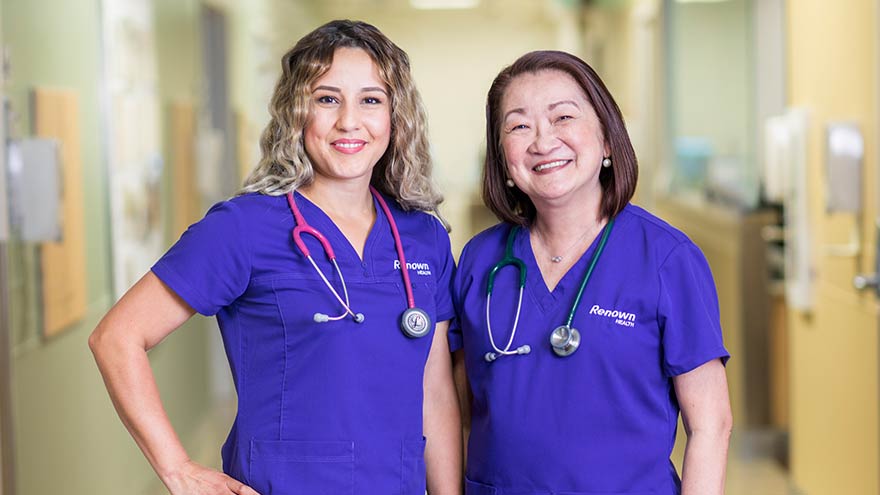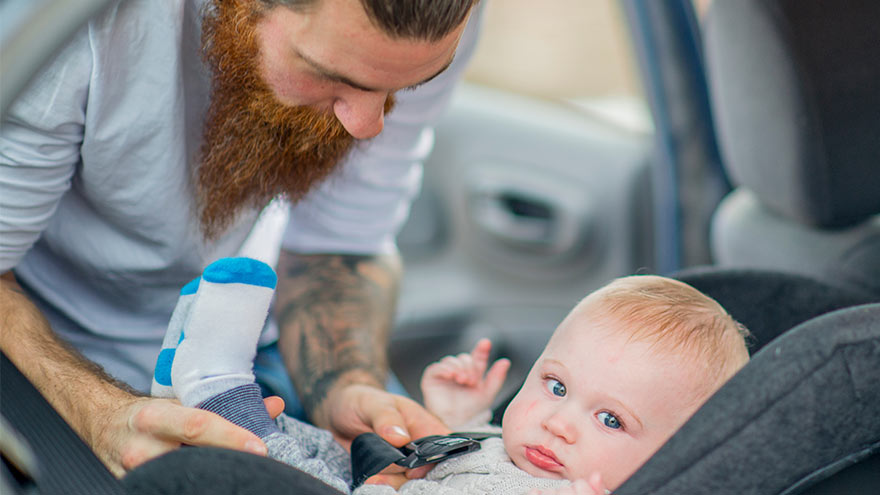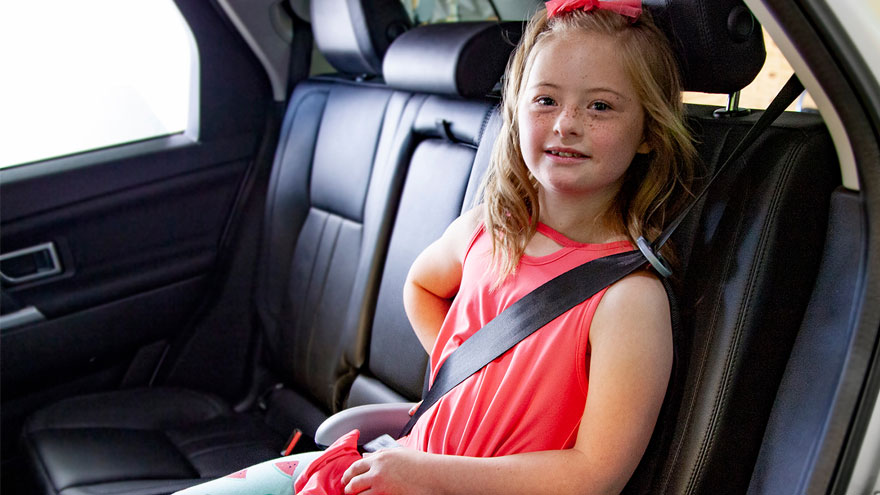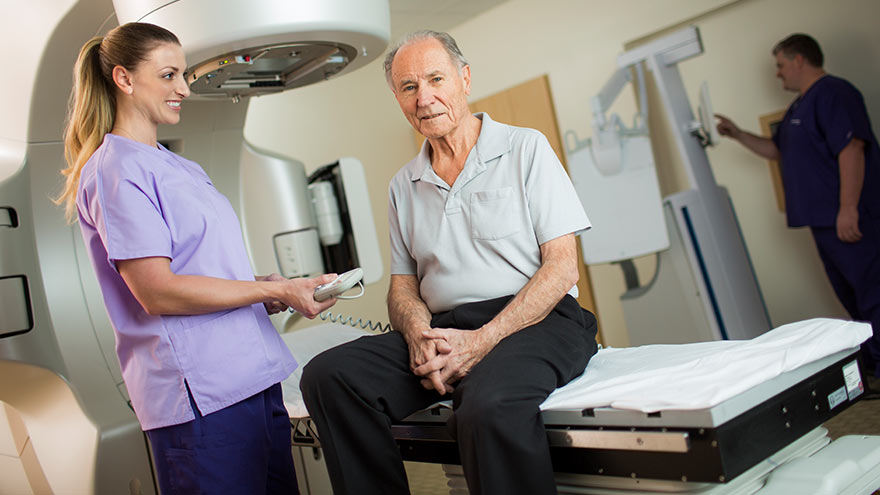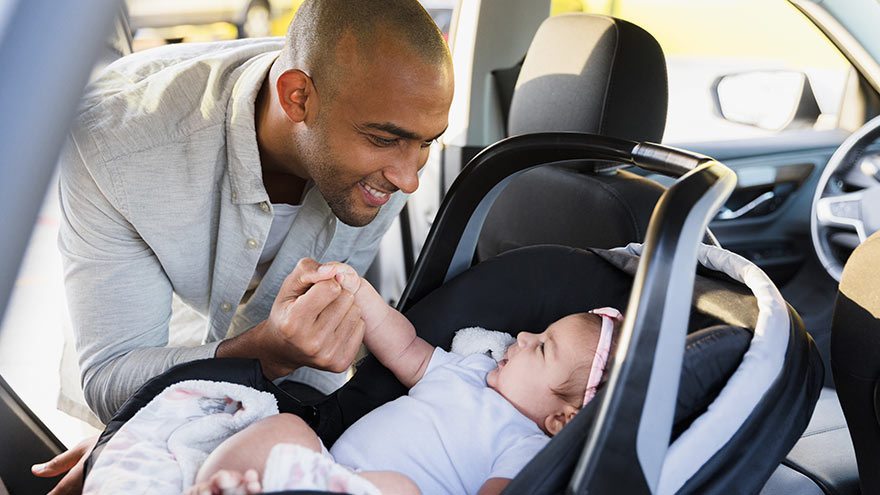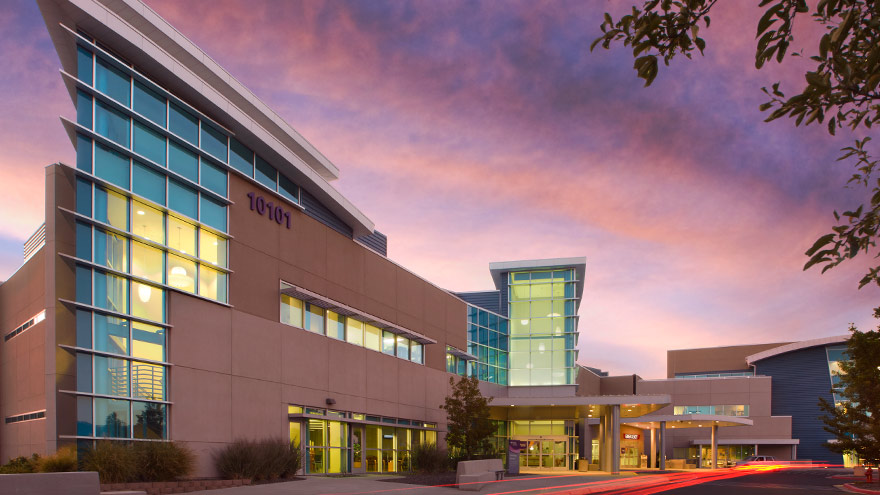Search
-
One Patients Story of Survival
Thanks in part to the care provided by Renown’s award-winning team of ICU nurses, Tony Mowatt is alive, thriving and engaged. Read his story — and learn about the exclusive Beacon Award of Excellence — below. The open road. The growl of the engine. The feeling of freedom. That’s what Oakland resident Tony Mowatt was enjoying as he drove up Highway 88 toward Reno for the semi-annual Street Vibrations event. But he wasn’t expecting to hit the diesel truck — or to fly off of his bike over 100 yards, skidding onto the side of the road. He was severely injured and in the midst of rural Nevada. He had crashed just outside Centerville, Nev., and was miles away from any critical care hospital. Having the only trauma center equipped to treat his serious injuries, Tony was flown to Renown Regional Medical Center and admitted to the intensive care unit (ICU). ICU Nurses Treat Patient, Support Family Tony’s girlfriend, Tasha Klubock, was notified by his friend that he had been taken to the hospital. She immediately drove from Oakland to Reno to see Tony at Renown. Her first night there was overwhelming and scary — nobody knew if Tony was going to survive. But the nurses helped Tasha cope with the initial shock. Caring for the patient isn’t their only job — they also care for the family. “They [the nurses] just kept coming in and checking on me,” she said. “Angela was so amazing that first night. I really just bonded to her, and I remember when the shift switched, I panicked thinking about who was coming on and wanting to meet the next nurse … But they all came to talk to me — I had updates from everybody. It was just amazing.” ICU Nurses Became Family Tony spent 32 days in Renown’s Sierra ICU, surviving a serious head injury, all with Tasha by his side. He and Tasha still stay in touch with Renown nurses. “Even though this was literally one of the most hideous, craziest things to go through,” Tasha said. “There was so much hope and they became such a family to me and I still think of that time fondly because of the nurses.” “I’m alive because they wanted me to be,” Tony said. And Tony and Tasha are now happily engaged and planning their wedding. Exceptional Care: Renown ICU Nurses Win Awards Renown’s ICU nurses provide care like this every day to countless patients — it’s so second nature to them that they forget how exceptional it truly is. But it’s certainly care like Tony’s that has earned them national recognition. The American Association of Critical Care Nurses awarded the Beacon Award of Excellence to the Sierra, Cardiac and Roseview ICUs. These are the only ICUs in Nevada to obtain this honor. The Beacon Award recognizes critical care nursing teams who exemplify excellence in areas like leadership, process systems, quality care, knowledge, learning and development, excellence in patient care and superior patient health outcomes. “I couldn’t have been more proud of what we’ve done to accomplish this,” said Nick Dovedot, Cardiac ICU nurse. “It represents who we are. Just a great group of individuals who all work together as a team to make our patients get better.”
-
Get to Know the Types of Car Seats
Parents often struggle with installing and choosing car seats for their children. Picking out a car seat for your child is a never-ending battle. Safe Kids Washoe County has made it simple for you to understand the types of car seats that will work for your child. Types of Car Seats Rear-Facing Only Seat. Your baby's first car seat is often used from 5 to 40 pounds. People usually buy this type of seat because it is portable. Convertible Car Seat. This seat is larger and stays in the car; it may be rear-facing until your child is two years or more. After that, it can change to a forward-facing seat. Forward-facing-only car seat. This type of seat is used in one direction and has a 5-point harness and top tether. Combination seat. This is a forward-facing seat with a 5-point harness and top tether and can change into a booster seat when you remove the harness. 3-in-1 car seat. This seat also stays in the car. You can use it rear-facing, forward-facing, and then later, as a booster seat. Booster seat. It boosts the child for a safer and more comfortable fit of the adult seat belt. Make sure your child has outgrown the weight or height limits allowed in the forward-facing car seat. The seat belt must lie flat across your child's chest, on the bony part of the shoulder, and low on the hips or upper thighs. Most children will be between the ages of 8 to 12 years old before they are ready for the seat belt alone. Have a trained car seat technician check your installation Why: 3 out of 4 car seats are installed improperly, with some studies show that the misuse rate is 90%, with the average car seat having three mistakes. Solution: Ensuring that your child's car seat is installed correctly by a certified car seat technician will ensure your child's safety.
-
Local Organization Receive $250K Build Health Challenge Award
Award given to Truckee Meadows Health Communities, Renown Health & Washoe County Health District. Truckee Meadows Healthy Communities (TMHC), Renown Health and the Washoe County Health District received the BUILD Health Challenge® award, a $250,000 grant to support Caring For Reno’s Elders (C.A.R.E.) program. The award comes as a collaborative result of more than 30 local organizations submitting a proposal for the funding. Renown Health announced that the organization is matching the grant alongside other pledged funding from the community, bringing the current C.A.R.E. support to $580,000. Together the entities will focus on senior loneliness and the health issues it creates. The partners are honored that Truckee Meadows was selected as one of 18 communities to receive funding from BUILD in the 2019-2021 term. “C.A.R.E will be a community approach to enhance life quality for elders by reducing social isolation and loneliness, issues that seriously impact senior health,” said co-team leader Kindle Craig, Sr. Director Renown Institutes. “Loneliness is the root cause of many issues including suicide1 , chronic disease2 and a reduction in lifespan3 . Washoe County senior suicide rates are two and four times the national rate for those aged 65 and 85 years, respectively4 . That is unacceptable.” Sharon Zadra, TMHC executive director and co-team leader, said this project will tackle barriers to socialization such as access to affordable housing, transportation and healthcare. “We’ll bring the entire community on-board, long-term, to increase social connectedness and reduce health and mortality issues associated with loneliness by starting a cross generational ‘Kindness Epidemic,’” Zadra said. The BUILD Health Challenge is a national program focused on bold, upstream, integrated, local and data driven projects that can improve community health. The award provides funding, capacity building support and access to a national peer-learning network to enhance collaborative partnerships locally to address our community’s most pressing health challenges. The C.A.R.E team expresses special thanks to the BUILD Health Challenge for its support of this initiative. “Loneliness and isolation in our senior population leads to declines in both mental and physical health, and increased mortality,” said Kevin Dick, Washoe County District Health Officer. “We are incredibly honored to join the BUILD cohort, teaming with TMHC and Renown Health to bring long-term solutions by building a cohesive social network to improve the health of our elders.” The BUILD Health Challenge® is made possible with the support of: BlueCross BlueShield of South Carolina Foundation, the Blue Cross and Blue Shield of North Carolina Foundation, Blue Shield of California Foundation, Communities Foundation of Texas, de Beaumont Foundation, Episcopal Health Foundation, The Kresge Foundation, Methodist Healthcare Ministries of South Texas, Inc., New Jersey Health Initiatives, Robert Wood Johnson Foundation, and W.K. Kellogg Foundation. TMHC, Renown Health and WCHD have worked united for the last five years, rallying diverse partners and community leaders to influence and advocate for the region’s capacity to ensure a healthy community.
Read More About Local Organization Receive $250K Build Health Challenge Award
-
Transitioning Your Child Out of Their Car Seat
Car seat technicians often find parents are moving their child to their next car seat stage too soon, as they get older. Here are a few reminders of when to transition your child from their booster seat to a seat belt. Moving to a booster seat too soon According to Safe Kids Worldwide, nearly 9 in 10 parents remove children from their booster before they’ve reached the recommended height, weight, or age of their car seat recommendations, which leaves the seat belt in a position on the child that could injure them. If the child is not the proper height, the seat belt can rise up on the belly, instead of the hips where it’s supposed to sit, which can lead to spinal cord damage or whiplash in the event of a car crash. Solution: You can switch from a car seat to a booster seat when your child has topped the weight allowed by the car seat manufacturer; typically 40 to 80 pounds (18 to 36 kilograms). Remember, however, that your child is safest remaining in a car seat with a harness for as long as possible. Booster seats must always be used with a lap and shoulder belt — never a lap-only belt. Transitioning to a safety belt too soon Older children need booster seats to help ensure the seat belt stays properly positioned on their body. The lap belt should lie low across the child's hips and pelvis with the shoulder belt crosses the middle of the child's chest and shoulder, so that in the event of a crash, the forces are applied to the hip bones and not the abdomen. If the lap belt is not positioned properly then it could lead to injuries to the spinal cord and abdominal organs. Solution: Most kids can safely use an adult seat belt sometime between ages 8 and 12. Always use a booster seat until the child passes the 6-step test Your child reaches a height of 4 feet, 9 inches (nearly 1.5 meters) Their back is flat against the seat back. Knees bend over the edge of the seat and feet are flat on the floor. The shoulder belt sits on their shoulder and chest (not face or neck.) The lap belt sits low on their hips and touches their upper thighs (not on their stomach.) Your child can sit comfortably this way for the entire trip. The American Academy of Pediatrics reminds us that the back seat is the safest place for children younger than age 13.
Read More About Transitioning Your Child Out of Their Car Seat
-
What Is the Importance of Having an Institute for Cancer?
What is an institute for cancer — and why does it matter that we have one right here in Reno? Here, a radiation oncologist answers those questions and more. Sadly, our community health needs assessment shows cancer is the second leading cause of death in Washoe County. But many residents may not know there is an institute for cancer right here in Reno that can care for you or your loved one after diagnosis. Dr. Michael Hardacre, a radiation oncologist with Renown Institute for Cancer is here with more. What is an institute for cancer? The way I like to think of it: An Institute has healthcare providers highly trained in patient-centered care. For example, when you have cancer, many times you’ll see a lot of doctors. A program brings those doctors together — so you really have one team working together. An Institute takes that one step further. Say there are other needs beyond the doctor’s office such as nurse navigators, dietitians, physical therapists to help you get on track, etc. An Institute really proactively thinks of the need of the cancer patient. It then makes sure all those things are available to them throughout their treatment. The term “institute for cancer” identifies a cancer program that is comprehensive and multidisciplinary in nature. For Renown, that means that we have the specialists in medical oncology, surgical oncology and radiation oncology working together with other specialists to assure that a patient has coordinated care throughout the entire treatment course of cancer care. Together with cancer prevention and diagnostics, genetic assessment, supportive care, clinical trials, and cancer survivorship, the institute for cancer provides care for the community, families and patients along the entire spectrum of cancer care. What types of cancer do you treat? We’re fortunate to be able to provide cancer treatments for all types of cancers, and we’re one of the major referral centers for northern Nevada. Most commonly, just like much of the country, lung cancer, prostate cancer and breast cancer are the most frequent we see. Our care spans brain, to neck cancer and everything in between. As an accredited comprehensive community cancer program, Renown Health provides services for all cancer types. The highest volume cancers treated at Renown are breast, colorectal, lung, genitourinary, blood and gynecologic cancers. Most treatments can be done right here in Reno, but when there are specialty needs such as stem cell or bone marrow transplantation, we partner with quaternary centers, like Stanford, to assure a smooth transition of care both to and from the quaternary center. What kinds of care and treatments are offered? We offer a wide range of comprehensive care. We treat the cancer itself — surgical, radiation oncology, medical oncology in the form of chemotherapy or pills. Also addressed: dietary needs, physical therapy and navigation through this whole process. People may be surprised by the scope and scale of the Renown Institute for Cancer. For instance, our Radiation Center has the latest technologies to treat cancers. This includes the Linear Accelerators, which are machines with treatment planning software tools. In addition to the traditional external radiation treatments provided in most centers, Renown performs specialty treatments using High-Dose Brachytherapy, a treatment with an active radiation “source” and in Brain Stereotactic Radiosurgery, assuring that patients can stay right here in northern Nevada — close to home. What does that mean for the quality of care? I think it’s always great in any environment to have external people come into your program and not only share what’s happening nationally and what we could do better, but also to validate “are you doing things at the highest level you can?” That accreditation process is just one way to give us that seal of approval. We’re lucky enough this year to get the gold award by the American College of Surgeons — its highest honor. We were honored to receive it. Why is important that you’re an accredited institute? Accreditation assures our community that quality is a top priority for us. Each of the accrediting bodies has a set of standards that identify service and quality standards. Renown Institute for Cancer has the following accreditations: American College of Surgeons’ Commission on Cancer: Full Cancer Program accreditation, standards address issues from cancer prevention/diagnosis to treatment to survivorship and/or end-of-life. Renown received the Gold Level Accreditation in 2018, the highest level of accreditation possible; American College of Surgeons’ National Accreditation Program for Breast Centers: Full Breast Center/Program accreditation, standards address issues from breast cancer prevention/diagnosis to treatment to survivorship and/or end-of-life; American College of Radiology – Radiation Therapy: Full Radiation Oncology accreditation for radiation equipment, treatment planning, treatment and treatment follow-up; and American College of Radiology – Mammography Services.
Read More About What Is the Importance of Having an Institute for Cancer?
-
Pool Safety: Things To Know About Drowning
The warm weather is here and pools are open. Swimming is a great way to keep your kids cool, occupied and exercised throughout summer, however pools come with their fair share of risks. Before you take your children swimming, check out these pool safety tips. Pool safety is something every parent needs to take more seriously. Why? Because drownings of young children ages one to four have increased in recent years. Unfortunately, drownings are the number one cause of death in this age group - we lose the equivalent of 10 school buses full of children to fatal drownings in the U.S. each year. With warmer temps and hopes of cooling off in a local pool, you can’t be too careful when it comes to protecting your children from the risk of drowning. Children are naturally drawn to water, so parents must be extra aware in order to protect their kids from diving in headfirst. Kris Deeter, MD, pediatric intensive care physician at Renown Children’s Hospital, offers tips to keep your littles safe in the water. Preparing Your Child for the Pool People aren’t born knowing how to swim. This means parents must teach their children about swimming and pool safety if they want them to be safe and confident around water. It can take years to develop these skills, so the key is to start when your children are very young. Here are some ground rules: Teach your child to swim starting at age one. We recommend enrolling your toddler in swim classes; there are several organizations in the Reno-Tahoe area that offer baby and toddler swim classes. Keep your kids away from plastic and inflatable pools - they’re easy for children to fall or climb into and drown. They’re also a breeding ground for bacteria. Floaties and water wings are not safe! They are not a safe substitute or “crutch” for learning how to swim and they can lead to drowning if the child is using them incorrectly or while unsupervised. Stay within arm’s reach of babies and toddlers when at the pool. Supervision alone is not enough – you must be within arm’s reach in case they fall in and need to be rescued quickly. Learn child and infant CPR. If a drowning does occur, the best course of action is to call 911, get the child onto dry land and conduct CPR until breathing is restored or the EMTs arrive. Pool Parties: A Risk for Drowning? Surprisingly, pool parties, a common summer pastime, actually increase the risk of drowning incidents. Although responsible adults are usually at pool parties, distractions ranging from alcohol to pool toys can actually make it easier for drownings to occur unnoticed. Does this mean you should RSVP “no” to the next pool party your child is invited to? Not if you follow the pool safety tips below: Attend the party with your child so you can supervise them while they swim. Remove unused floaties and toys from the pool. They can obscure visibility, making it difficult to see a child in the pool. Don’t drink alcohol while supervising a pool party. Assign an adult “water watcher” to pay constant attention to children in the pool. Pool Safety Precautions for Homeowners If you own a pool, there are several more precautions to ensure the safety of your children. Even if your kids are strong swimmers who have mastered the rules of pool safety, there may be neighbors or friends who are younger and more vulnerable to drowning. You must undertake precautions for these children too. Some of these may seem time-consuming or expensive, but they are worth it to prevent a child from a fatal drowning. To keep your pool or spa safe, please: Cover your pool or spa when not in use. Choose a pool or spa cover with safety features like locks, safety sensors or alarms. Fence in your pool or spa area. The fence should be locked and at least four feet tall. Do not leave toys in the pool area as these may attract children.
-
2 Dangerous Car Seat Mistakes and Solutions
Car seat mistakes can have very serious consequences. Misuse of a car seat can injure your child, or fail to keep them safe in the event of a crash. A lot goes into finding the right car seat for your child. With so many factors to consider (including age, weight and height of the child, type and brand of a car seat, cost of the car seat, etc.) it can be easy to forget critical factors. Here are two common mistakes that certified technicians often find when speaking with parents. Mistake #1: Getting a used car seat without knowing its history Why: A used or secondhand car seat can pose several factors that can compromise its safety in a crash. First, car seats expire six to ten years after their date of manufacture, so refer to the car seat's manual for recommended car seat longevity. The safety mechanisms can be compromised if a car seat has been in a crash. So it's crucial to replace your car seat following a collision. Solution: Only use a car seat if you know its history. A new car seat is your best bet, as they are up to date on the latest safety guidelines, and safety mechanisms are up to standard. However, if you are considering a used car seat for your child, please ensure the following: The car seat has never been in a car crash. The car seat isn't expired or outside the manufacturer's recommended longevity. It comes with the car seat manual and has all safety labels, including manufacture date, model number, and use instructions and restrictions. The car seat or any of its parts have not been recalled. The overall state and integrity of the car seat and its parts are undamaged. The carseat or any of its parts have not been recalled and are present and in working order.
-
Thomas S Dolan Pulmonary Rehabilitation Program
The program becomes first of its kind to be accredited in Nevada Renown Health is pleased to announce the certification of the Thomas S. Dolan Pulmonary Rehabilitation program at Renown South Meadows Medical Center by the American Association of Cardiovascular and Pulmonary Rehabilitation (AACVPR). AACVPR certification demonstrates that an organization's Pulmonary Rehabilitation Program is aligned with current guidelines set by the American Association of Cardiovascular and Pulmonary Rehabilitation for appropriate and effective early outpatient care of patients with cardiac or pulmonary issues. Certification offers peace of mind, so that patients can feel confident in knowing that staff has the experience and skills necessary to coordinate the many issues faced by people receiving a life-changing cardiac or pulmonary diagnosis. Pulmonary rehabilitation programs help people with health issues such as asthma, chronic bronchitis, pulmonary fibrosis, or chronic obstructive pulmonary disease (COPD) recover faster and live healthier. “Having access to quality pulmonary rehabilitation services so close to home, staffed by a highly skilled group of compassionate care providers, truly is a gift to our community,” said Tony Slonim,MD, D.Ph., president and CEO of Renown. “We are extremely proud of the work being done in our pulmonary rehabilitation program, and also forever grateful for Tom Dolan’s donation to the program in 2019, which empowers Nevadans to improve both their health and quality of life.” “Thomas S. Dolan Pulmonary Rehabilitation is the only accredited pulmonary rehabilitation program in the state of Nevada,” said Renown South Meadows Medical Center and Rehabilitation Hospital Vice President Chris Nicholas. “We take pride in this distinguished honor from the AACVPR as it acknowledges and amplifies the life-changing work happening here. Our dedicated caregivers provide support to our patients every step of the way, helping them lead vibrant and fulfilling lives despite their health conditions.” The comprehensive pulmonary rehabilitation program at Renown South Meadows Medical Center offers treadmills, stationary bicycles, strength training and an education classroom to help patients achieve health goals. To earn accreditation, Renown’s pulmonary rehabilitation program participated in an application process requiring extensive documentation of the program’s practices. AACVPR Program Certification is the only peer-review accreditation process designed to review individual programs for adherence to standards and guidelines developed and published by AACVPR and other related professional societies. In November 2019, Tom Dolan, owner and founder of Dolan Auto Group, donated to the Pulmonary Rehabilitation at Renown South Meadows Medical Center after his personal experience thriving in pulmonary rehabilitation brought northern Nevada’s capabilities, and needs to his attention. His generous donation has allowed Renown to double the number of patients who receive treatment and increase the access to pulmonary rehab in our community. “As a former patient myself, I found so much benefit in my pulmonary rehab,” said Dolan. “I have always wanted to support this program and increase the number of people it serves. It’s great to see that we now have the only certified pulmonary rehab in Nevada. “The most essential component of lung health is breaking the cycle of inactivity associated with lung disease,” said Lung Critical Care Physician Dr. Farah Madhani-Lovely. “Our community is fortunate to have an accredited program like this to empower our patients.” About AACVPR Founded in 1985, the American Association of Cardiovascular and Pulmonary Rehabilitation is a multidisciplinary organization dedicated to the mission of reducing morbidity, mortality and disability from cardiovascular and pulmonary disease through education, prevention, rehabilitation, research and disease management. Central to the core mission is improving the quality of life for patients and their families. Learn more about AACVPR at www.aacvpr.org.
Read More About Thomas S Dolan Pulmonary Rehabilitation Program
-
South Meadows Medical Center Named Number 1 Hospital
U.S. News & World Report recently released their 2020-21 Best Hospitals rankings naming Renown South Meadows Medical Center as the number one hospital in Nevada. U.S. News looked at 4,554 hospitals, which represent nearly all U.S. facilities providing inpatient care. Hospitals are evaluated across a wide range of conditions and procedures, including 16 medical specialty areas of care. “We are committed to be among the best in the nation for quality, safety and patient experience,” said Tony Slonim, MD, D.Ph., FACHE, president and CEO of Renown. “This ranking confirms what Renown has always been dedicated to — providing the best patient care possible. Quality and safety are the responsibility of every employee and physician at Renown, and we are proud that Renown South Meadows has been chosen as the best in the state and among the best in the nation.” “We thank the incredible physicians, nurses and employees at Renown South Meadows Medical Center and across Renown for their dedication to excellent patient care – our employees, patients and our community are the true award winners,” said Chris Nicholas, Vice President & Administrator, Renown South Meadows & Renown Rehabilitation Hospital. “We applaud them as being not only the best in the state, but among the best in the nation.” “We are proud that Renown South Meadows is one of Nevada’s highest rated hospitals, and it’s exciting to have that recognition. Over the last year both our acute care hospitals – South Meadows and Renown Regional Medical Center, have made substantial improvements. We are working every day to ensure we are delivering the highest quality, safest care to our patients and our community,” said Dawn D. Ahner, DSc, FACHE, Chief Operating Officer — Acute Services for Renown. Renown South Meadows has been recognized by several national organizations for excellence and quality, including the Joint Commission, Leapfrog and Health Insight. Renown South Meadows Medical Center is an Accredited Chest Pain Center, and a Pathway Designated hospital for nursing excellence. Renown South Meadows provides an emergency department staffed 24/7 with board-certified emergency physicians, a wide range of services including primary and urgent care medical offices, a lab and health improvement programs. Renown is currently recruiting outstanding employees at https://careers.renown.org/.
Read More About South Meadows Medical Center Named Number 1 Hospital
-
Renown Regional Medical Center Recognized Among Nations Top Hospitals In Critical Care
The region’s only trauma center receives top honors from Healthgrades What is Healthgrades? Healthgrades, a leading national resource for trusted information about physicians and hospitals, recently announced the recipients of their 2021 Specialty Excellence Awards. These awards recognize hospitals with superior performance and have selected Renown Regional Medical Center in Reno, Nv. as northern Nevada’s top hospital for critical care. Hospitals in this ranking demonstrate excellent patient clinical outcomes in treating pulmonary embolism, respiratory system failure, sepsis, and diabetic emergencies. Health grades further distinguishes hospitals that stand out as America’s 100 Best Hospitals for Specialty Care™, with Renown Regional Medical Center identified as Nevada’s only critical care hospital to be bestowed with this honor. What this Award Means To Us “At Renown, I am honored to work beside dedicated healthcare heroes who are working tirelessly to make a genuine difference in the health and well-being of every patient and family we serve,” says Tony Slonim, MD, D.Ph., FACHE, president and CEO of Renown. “Having trained and served as a pediatric intensive care physician, this honor from Healthgrades does so much to recognize the compassion, skill, and determination of this incredible team. I join with our community in saluting the Renown Regional Medical Center’s critical care team as one of the best critical care hospitals in the nation.” “As the only accredited trauma center between Sacramento and Salt Lake City, we receive and care for critically-injured patients from over 100,000 square miles. Our communities depend on Renown Regional Medical Center for outstanding critical care,” says Dawn D. Ahner, DSc, FACHE, Chief Operating Officer, Acute Services. “Our multi-disciplinary critical care and intensive care healthcare teams are specially-staffed, equipped and designed to care for, closely monitor, and comprehensively care for patients with life-threatening conditions.” “Having a specialty-trained team of physicians, nurses, respiratory therapists, care managers, physical and occupational therapists around the clock, every day ensures that, no matter the illness or injury, a patient will be treated with the highest degree of care right away,” says Paul Sierzenski, MD, MSHQS, CPE, FACEP, Chief Medical Officer, Acute Services. “What it comes down to is this; the quicker and more accurately you get treated, the better your outcome will be. That's what makes being one of the most respected critical care teams in the country, so vital to all of us.” “At Renown, we have done so much over the years, to prepare to meet the need for rapid surges in critically ill or injured patients. Through this pandemic, many patients suffering from complications of COVID-19 have needed intensive care services,” says Erik Olson, MHA, Chief Executive Officer of Renown Regional Medical Center. “As the demand for critical care and intensive care continues to increase, the ratio of ICU beds to hospital beds will continue to rise as the ICU occupies an ever-larger role at the center of acute hospital care. We appreciate the recognition from Healthgrades demonstrating the Renown team’s unwavering commitment to the highest level of patient care and safety.” About Renown Health Renown Health is the region’s largest, locally owned and governed, not-for-profit integrated healthcare network serving Nevada, Lake Tahoe, and northeast California. With a diverse workforce of more than 7,000 employees, Renown has fostered a longstanding culture of excellence, determination, and innovation. The organization comprises a trauma center, two acute care hospitals, a children’s hospital, a rehabilitation hospital, a medical group, an urgent care network, and the region’s largest, locally owned not-for-profit insurance company, Hometown Health. Renown’s institute model addresses social determinants of health and includes Child Health, Behavioral Health & Addiction, Healthy Aging, and Health Innovation. Clinical institutes include Cancer, Heart, and Vascular Heath, Neurosciences, and Robotic Surgery. Renown is currently enrolling participants in the world’s largest community-based genetic population health study, the Healthy Nevada Project®. For more information, visit renown.org. About Healthgrades Healthgrades is dedicated to empowering stronger and more meaningful connections between patients and their healthcare providers. At Healthgrades, we help millions of consumers each month find and schedule appointments with their provider of choice. With our scheduling solutions and advanced analytics applications, we help our health system and life sciences clients cultivate new patient relationships, improve patient access, and build customer loyalty. At Healthgrades, better health gets a head start.
-
Renown Neuro Diagnostic Laboratory Nationally Recognized
Earning its third five-year accreditation, Renown’s neuro-diagnostic lab remains Nevada’s only accredited ABRET facility. The Renown Institute for Neurosciences is pleased to announce that the neuro-diagnostic lab at Renown Regional Medical Center has been re-accredited by the American Board of Registration of Electroencephalographic and Evoked Potential Technologists (ABRET). ABRET’s lab accreditation process evaluates technical standards, the quality of a laboratory’s output, and lab management. “Renown Health is a leader and a destination for health in treating neurological disorders and advancing innovations in neurology. The specialists at the Renown Institute for Neurosciences provide comprehensive brain, nerve and surgical support along with a full range of diagnostic and additional procedures and a disease-specific, patient-focused approach to care,” says Tony Slonim, MD, DrPH, FACHE, President and CEO, Renown Health. “This prestigious honor from ABRET means Renown’s Electroencephalogram (EEG) Laboratory has met strict standards and is recognized as a place where patients and physicians can confidently receive quality diagnostics.” “In addition to re-accreditation from ABRET, the Institute for Neurosciences has earned a Gold Seal of Approval by the Joint Commission and offers advanced treatment options including t-PA (Tissue Plasminogen Activator) and biplane angiography. The Level III accredited Epilepsy laboratory implements some of the newest treatments available,” said Renown’s Chief Medical Officer, Paul Sierzenski, MD, MSHQS, CPE, FACEP. “Renown patients also have access to the most promising new therapies through national clinical trials, which have been shown to significantly improve patients’ health and well-being.” “I am proud to recognize our dedicated team of caregivers for their continued passion and excellence in maintaining the highest standards in patient care,” said Renown Institute for Neurosciences’ Division Chief, Dr. Rolando Ania. “It is all thanks to their tremendous efforts that we remain the only ABRET accredited laboratory, as well as the only nationally accredited epilepsy center (NAEC Level III), in the state of Nevada.” Using a collaborative approach, specialists at the Renown Institute for Neurosciences use leading-edge diagnostic tools to identify neurological conditions and treat patients with the most effective techniques available. What is a Neuro-diagnostic Lab? A neuro-diagnostic lab allows care teams the technology to evaluate how a patient’s peripheral, autonomic, and central nervous systems function, and aid in diagnosing and treating conditions such as epilepsy, multiple sclerosis, Parkinson’s disease, stroke, and other diseases of the nervous system. What is an Electroencephalogram (EEG)? An Electroencephalogram (EEG) is a test that measures and records the electrical activity of the brain. During the test, special sensors called electrodes are attached to the patient’s head and hooked by wires to a computer. The computer then records the brain’s electrical activity on the screen. Using a collaborative approach, specialists at the Renown Institute for Neurosciences use leading-edge diagnostic tools to identify neurological conditions and treat patients with the most effective techniques available. Renown Health hospitals are ranked as Nevada’s top hospitals by U.S. News & World Report.
Read More About Renown Neuro Diagnostic Laboratory Nationally Recognized
-
How to Talk to Your Children About Vaping
According to the Centers for Disease Control (CDC), e-cigarette use isn’t just up among adults, but it has also tripled in usage for teens. Dr. Jose Cucalon Calderon, a Pediatrics Physician at Renown Health and an Assistant Professor of Pediatrics at the University of Nevada, Reno School of Medicine, provides helpful insight into e-cigarettes and the dangers it poses to kids and teens. What Are E-Cigarettes? E-cigarettes are electronic nicotine delivery devices. e-cigarettes use liquid nicotine as an alternative to traditional smoked cigarettes. e-cigarettes contain nicotine which is an addictive substance with known toxic side effects that, when released in very high doses, that can have health consequences and causes addiction. Nicotine is described as “toxic,” but the most "toxic" part of e-cigarettes' is everything else within the E-juice. Nicotine mainly keeps people coming back for more. According to the CDC, e-cigarettes are also advertised using the same themes and tactics that have been shown to increase youth use of other tobacco products, including cigarettes. In 2021, approximately 76% of students reported exposure to tobacco product marketing through traditional sources, and approximately 74% of students who used social media had seen e-cigarette–related content. What Does This Mean for the Health My Teen? We know that nicotine can affect brain development in kids and teens, so it is important to educate your teen on the risks of exposure. If you have young children in the home, it is important to be vigilant as well. One teaspoonful of liquid nicotine can be fatal for a young child. How Do I Monitor My Teen for E-Cigarette Use? Monitoring your children can be tricky for parents. E-cigarettes can be harder to detect, unlike traditional cigarettes that were easy to detect by smell and residual odor. E-cigarette use, or “vaping,” is often associated with a dry cough or chronic throat/mouth irritation. Overall, increasing research shows strong links between mental health conditions and posterior combustible tobacco use along with increased risk of marijuana use. Nicotine is addictive, but it does not cause altered mental status like the other drugs of abuse can. All parents are strongly encouraged to talk to their children about the potential dangers of e-cigarettes. What are the health risks of vaping? Vaping devices have been on the market for a relatively short period of time, with evidence-based health effects and complications still being discovered. Vaping effects poses many harmful risks to children and teens. The risks of vaping include: Chest pain Difficulty breathing Dizziness Headaches Impaired response to infection in the airway Inflammatory problems of the airway Nausea Nicotine addiction Seizures Vomiting For more information for both parents and teens about quitting smoking or vaping, you can click here. Parents can also use this tip sheet from the U.S. Surgeon General to talk to their child about vaping. The Substance Abuse and Mental Health Services Administration free national helpline number is 1-800-662-4357 (HELP). It is available 24/7, 365 days a year offering confidential treatment referral and information (in English and Spanish). If you or someone you know is facing a substance (or mental health) problem, please reach out to them.
